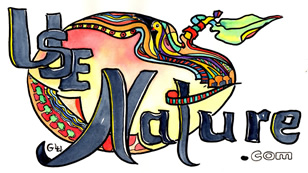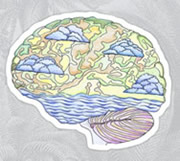useNature.com ... Holistic Health - Emotional Choice Counselling
Emotional Choice Counselling
The 'Functional' Meaning of Emotions
Lifestyle Online Magazine - Holistic Health Information
Article: The "Functional" Meaning of your Emotional Message

Article extracted from a workshop & book called:
DO YOU BELIEVE IN YOU - by Dieter Luske© - Gold Coast
... all following articles, are written as workshop manuscript
... questions were asked to stimulate active participation.
ARTICLE NUMBER - 18 - Chapter 3
The "Functional" Meaning of Emotions - (Emotional Message)
*Lets start this chapter with a trick question:
If you could choose right now,
which six emotions would you like to experience for the rest of your life,
and which six emotions would you choose to do without?
Please write those emotions down right now! And please don't read on until you have done so.
................ thinking .............. thinking ......... writing ......... :-) .. great, all done .... lets continue below ...
Are emotions positive or negative?
We usually view emotions as being either positive or negative, which is not very helpful. We must see an emotion more in the light of having the appropriate emotion for a matching situation. That way, we appreciate that a seemingly positive emotion like joy is not very positive if you are standing in front of your just-buried favourite aunt, (unless you stand to inherit a bundle).
Obviously the "appropriate emotion" would be sadness or grief.
Knowing that, you also can appreciate that sadness has a function, it helps you to get over the loss you have just experienced and therefore, sadness could be labeled positive or much better:
The RIGHT EMOTION, FOR the RIGHT SITUATION
To quickly sum up: there are no positive or negative emotions, there are only emotions for matching situations, which would be positive, whatever the emotion.
A mismatch therefore is what we may perceive as negative.
No matter how unpleasant an emotion seems to be, if it is the right emotion for the appropriate situation, it is positive, as it has a function.
All emotions have functions and are worth having as a feedback!
The function and feedback of an emotion is what can be used to change, to understand and control or to choose a more appropriate emotion.
We do have 3 ways reacting and responding to emotions.
-
The direct emotional response:
this one comes out of the blue and is therefore hard to predict and hard to prevent. The key to getting those emotions under control, is to listen and to be aware of what they are telling you. React accordingly and make sure that if you didn't like your response, react more appropriately next time. Reacting again and again with an inappropriate emotion means that you are the victim of your emotions, and you are not learning from your emotions and their functional aspects. -
The possible future emotion: this emotion is the one you can predict and often is fear related, and related to an event that you know is looming. One such event would be having to face a crowd of people to deliver a speech. (There are much easier examples of course, but let's go for the one which most people find scary). Knowing the emotion you probably will have, can help you to prevent that emotion from coming on. You can then choose a more appropriate one, which definitely should be something like high self-esteem, to overcome an emotional tense situation.
Obvioulsy, if you know a happy situation coming up, where your predicted emotion is happyness, you will have no need to change it. - The reflection on past emotions: Scan your past and remember how you reacted in past emotional situation. See those past emotional responses as experiences and reflect up on them to check if a more appropriate emotion would have been a better match.
( we will discuss more about how to change emotions later)
We can learn how to respond, before - during and after an emotional situation.
The next step is to learn about the functional attributes of your emotions, so that we can learn to respond appropriately and properly.
EMOTIONS AND THEIR FUNCTIONS
FRUSTRATION
Frustration is the emotion you get when you don't get what you want to get. I know that sounds slightly complicated. I choose that description because it matches my favourite line:
"if you do what you always do, you get what you always get."
Do you like what you always get? If not, you are, more than likely, frustrated.
In other words, you are not getting the kind of outcome that you want and expect, but you keep hoping, and (as there is still the possibility of achieving your outcome), this hope is what keeps you doing what you are doing.
The POSITIVE FUNCTI0N of frustration is consequently the motivation and energy to keep doing whatever you are doing. With anything worth pursuing, the emotion of frustration may be a valuable asset to have. Would you ever have thought before of choosing an emotion like frustration as an aid to help you in whatever you are doing?
The key word here, for positive frustration to work, is 'hope'. If however, there is no possibility of getting what you want to get, frustration would be truly frustrating and hence the wrong emotion to choose!
THE NEGATIVE FUNCTION of frustration therefore is to feel frustrated when in reality there is no hope left. In this instance frustration becomes a victim position. You are stuck in frustration - you get what you always get and you don't like it a bit. It's time to change!
To change, you could choose a more appropriate emotion, which is one step up in the scale of suitable emotions.
That emotiuon is 'Disappointment', and it will stop frustration instantly and free you from your stuck victim position.
DISAPPOINTMENT
The possibility of getting what you wanted is over and the right response is to recognise that it is over and let go.
It is definitely over, finished with, no hope left, no need for frustration here.
THE POSITIVE FUNCTION of disappointment is an acceptance that hope is gone, which lets you move on to more productive thoughts or things. It may not feel good at the time, but it usually gives you an invigorated feeling the next day, when you notice your newly achieved freedom and feel the satisfaction of having made a decision.
THE NEGATIVE FUNCTION is to misuse disappointment by stopping something which you should have pursued. This means giving up for all the wrong reasons, which leaves you with a bitter taste in your mouth and a low self-esteem, a victim position.
This is a situation in which to pick frustration as the preferred emotion.
SADNESS
Sadness is 'one up' on disappointment and like disappointment, its function applies when something is over or has changed, and the situation has to be accepted.
With sadness, something major has changed or come to an end.
It is a much deeper personal feeling than disappointment.
THE POSITIVE FUNCTION is to help you to overcome a major change in your life. It is an important emotion, especially in the case of death of a loved one, where without sadness and grief, life as it used to be could not go on.
Both sadness and grief are absolutely essential in coming to terms with such a major change.
THE NEGATIVE FUNCTION is to confuse sadness with self pity, as an over-reaction to minor changes, or to be stuck in sadness, using it in order not to do anything else, or as an excuse not to go on with life. This would place you in the victim position.
... to be continued with: Regret - Guilt - Anxiety
Article provided by the Editor - Dieter L.
Excerpt from a workshop & book - published 1993 - titled; "Do you believe in You"
www.usenature.com - Dieter Luske ©
Next: Article 19 - click > Regret - Guilt - Anxiety
or go back to the Article Menu > Self Help Article Menu
Discussion & Support Group > "Stress - Anxiety - Depression Group"
Buy Now
It happened in the seventies
A Memoir of Love, Colliding Worlds and a House on a Hill
Intriguing story of personal risk-taking, self-discovery and profound change.
Dieter Luske
author . writer . editor



